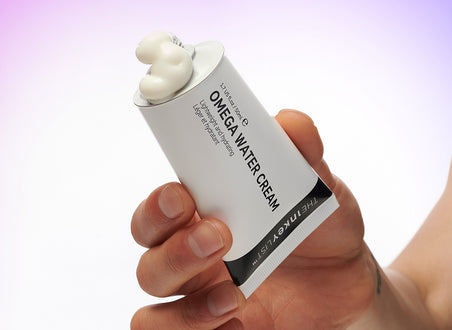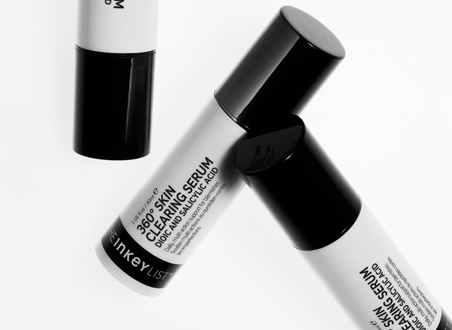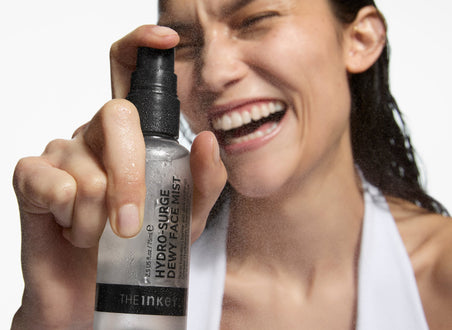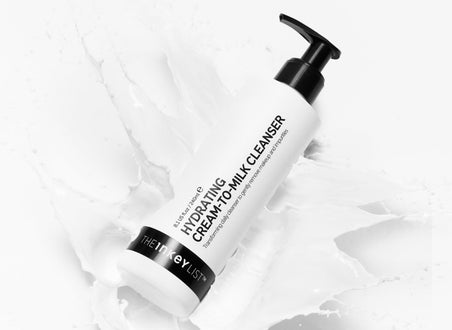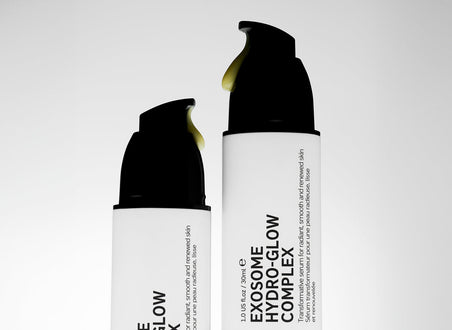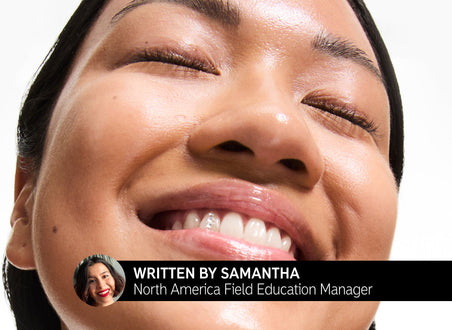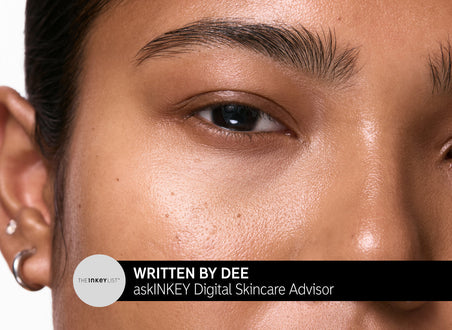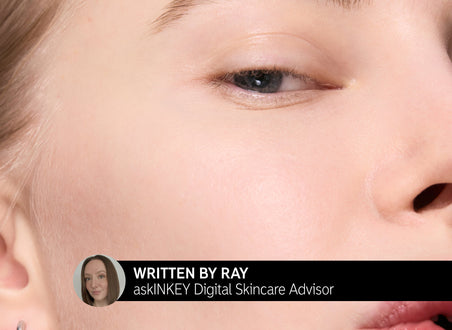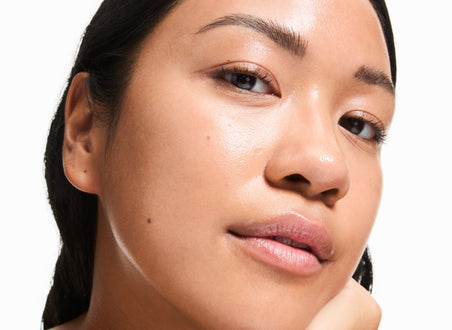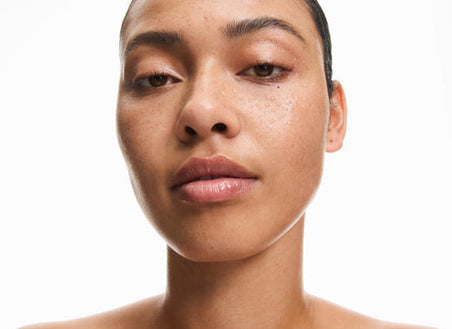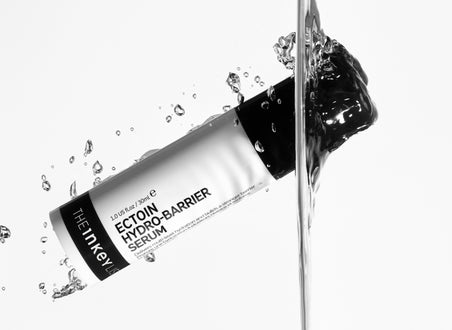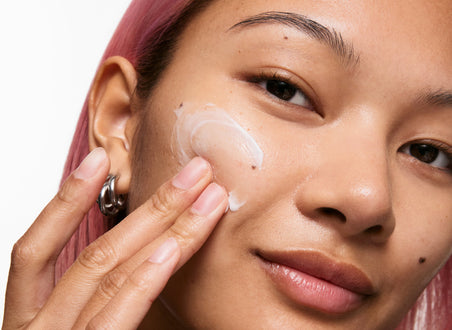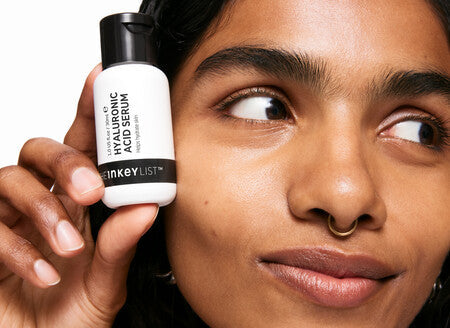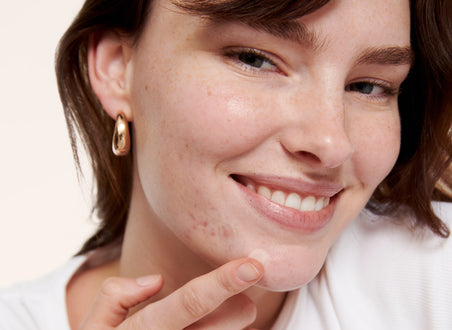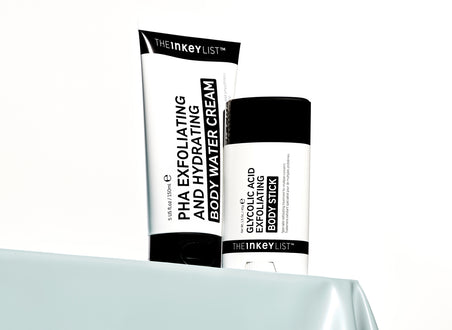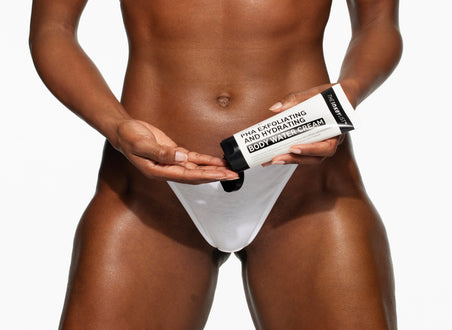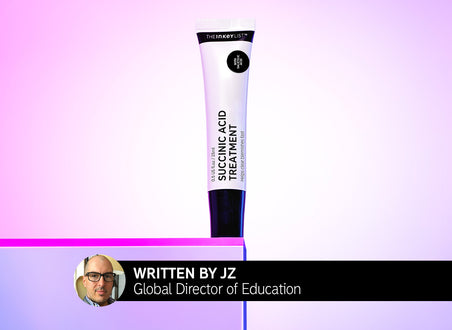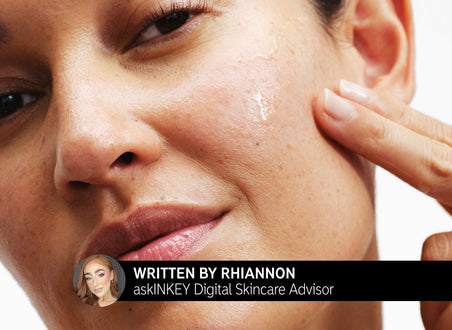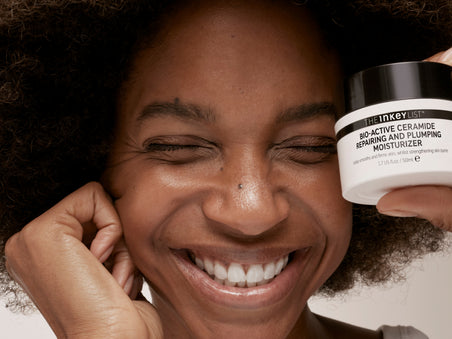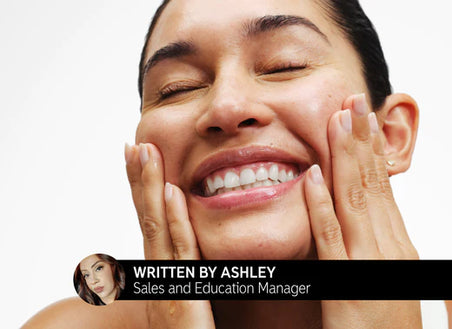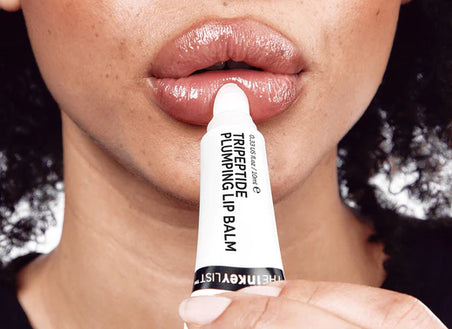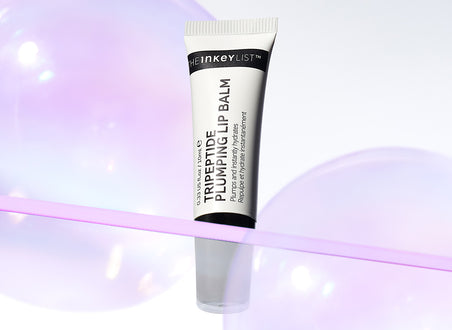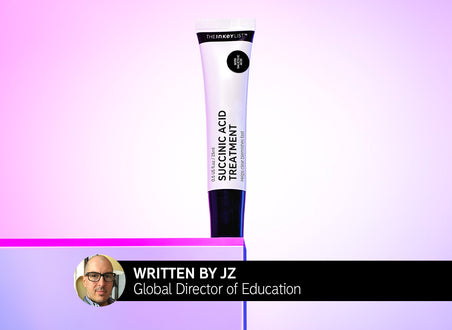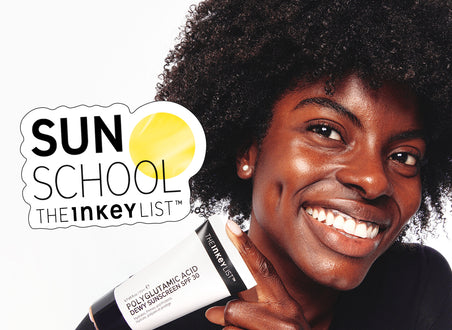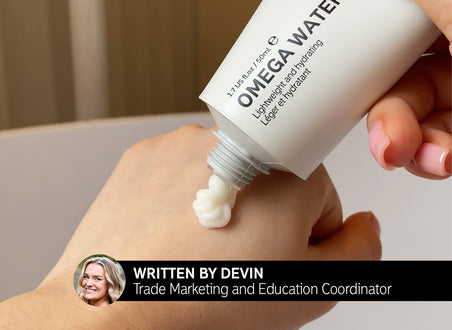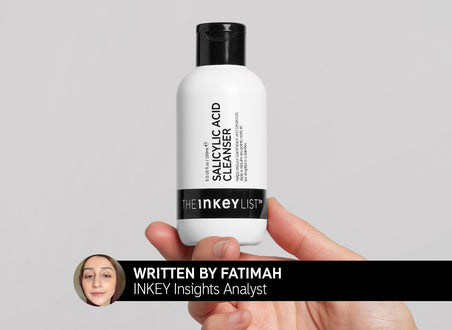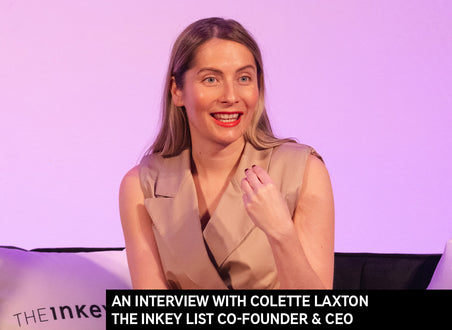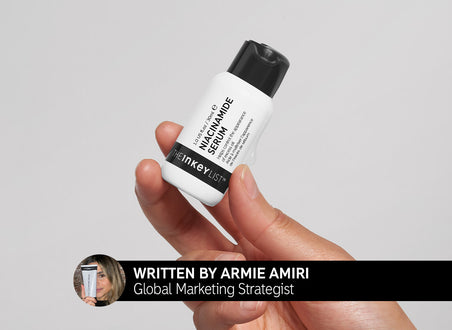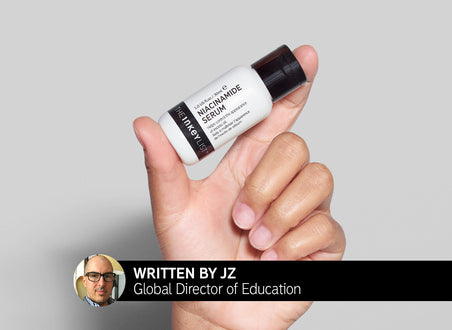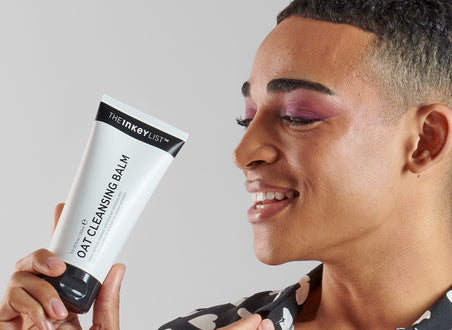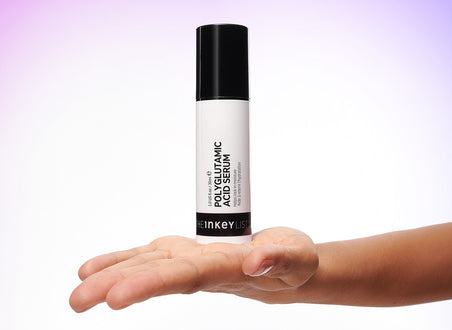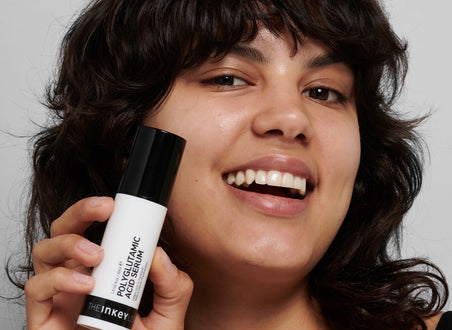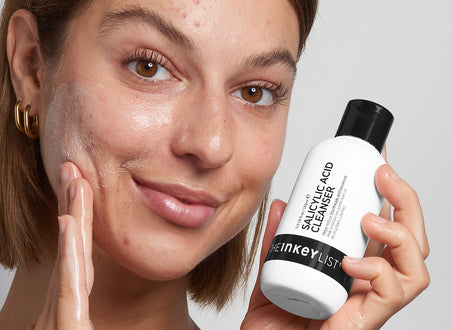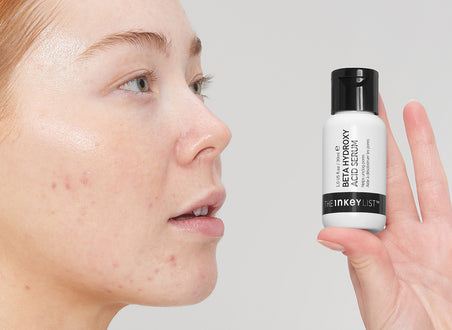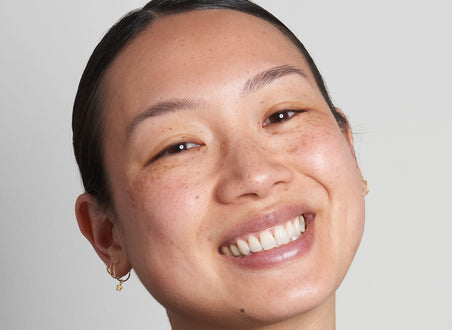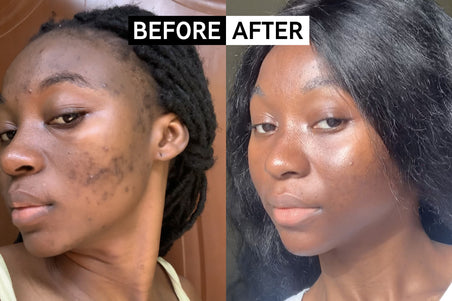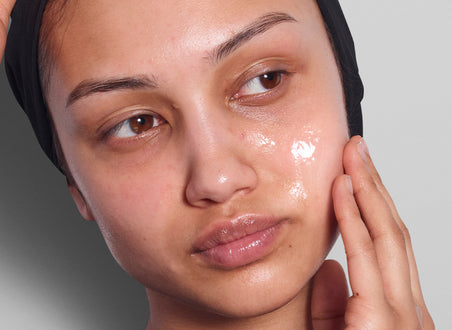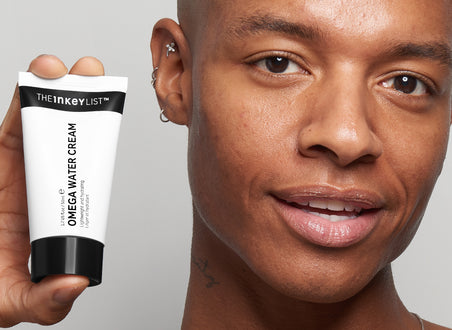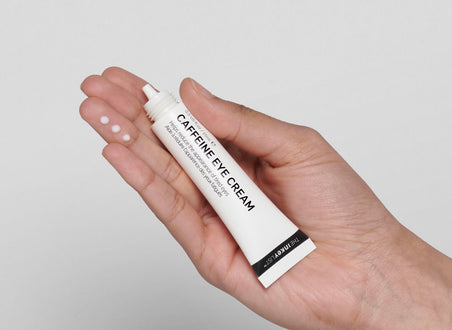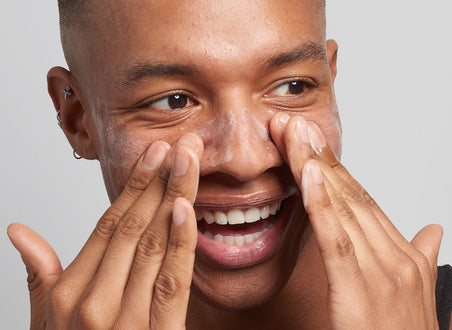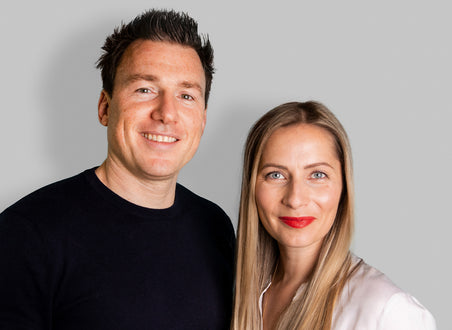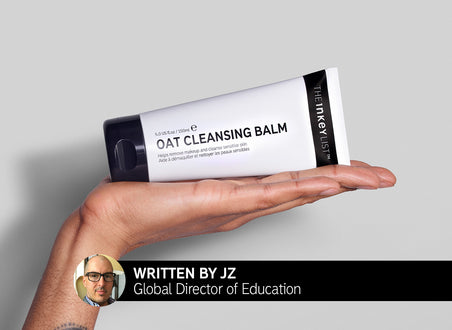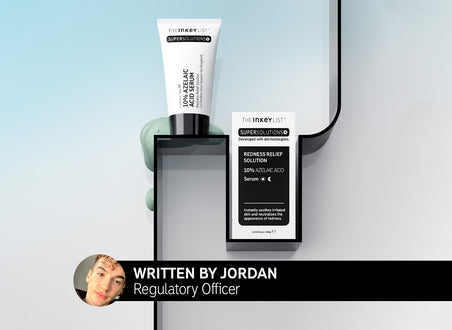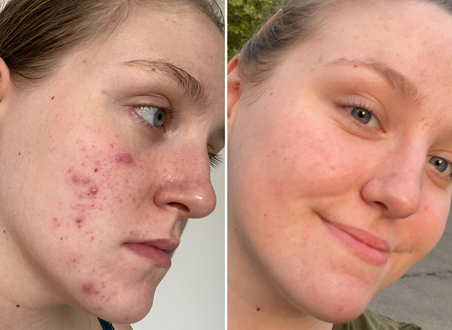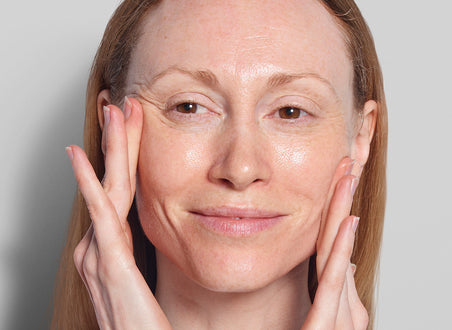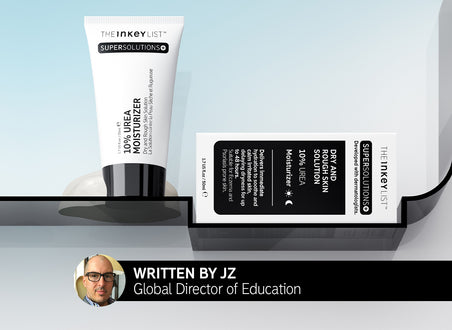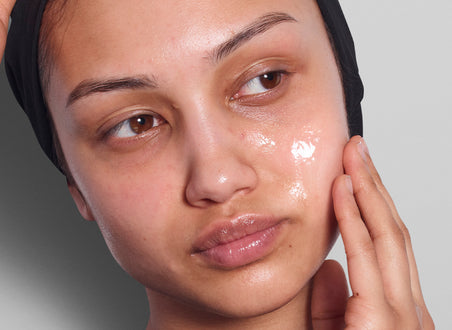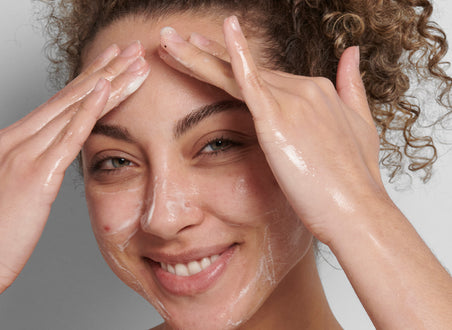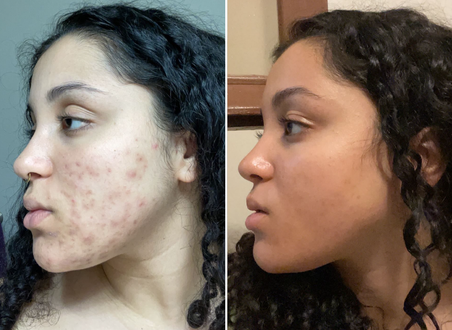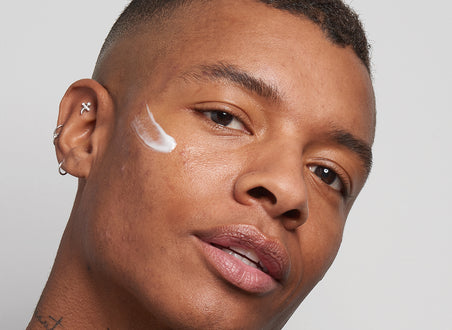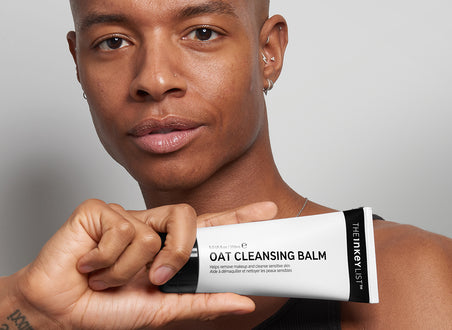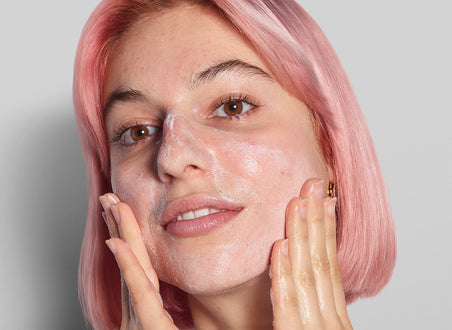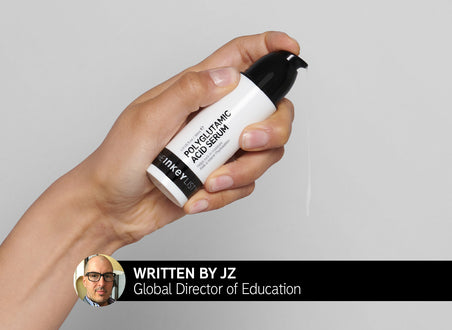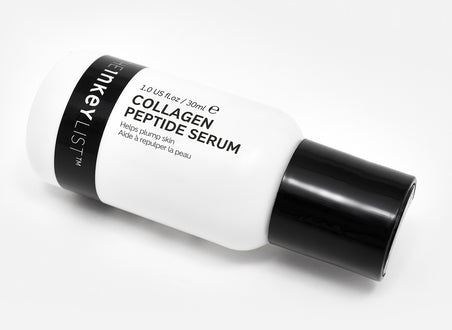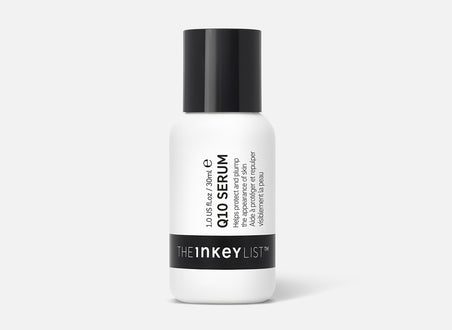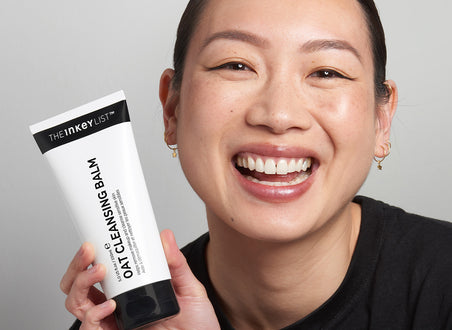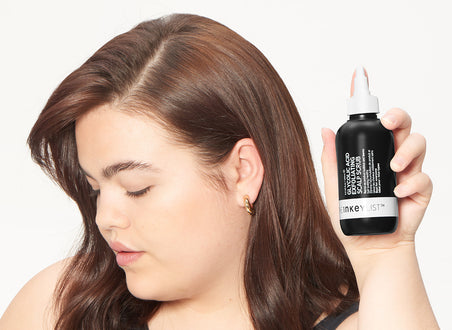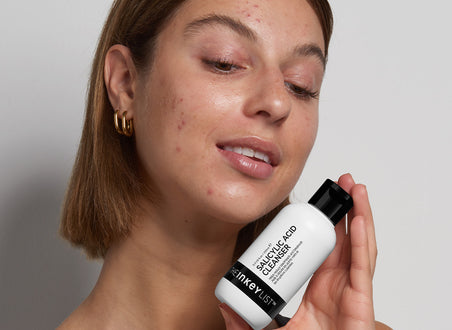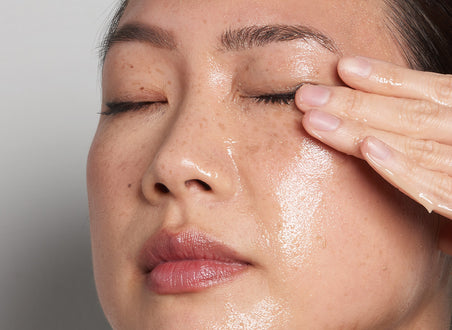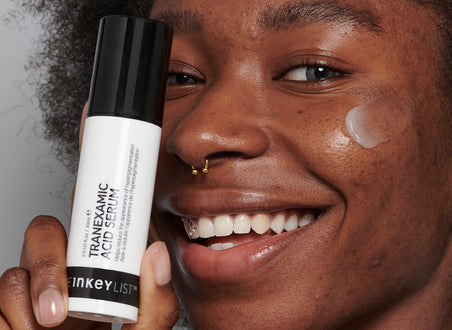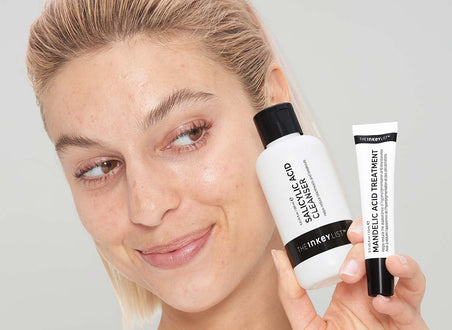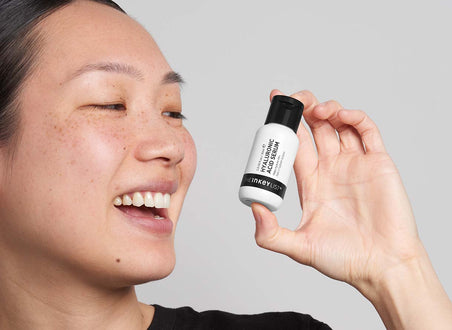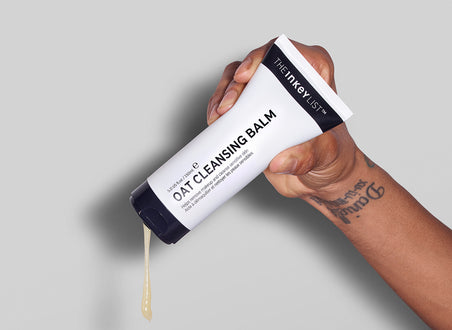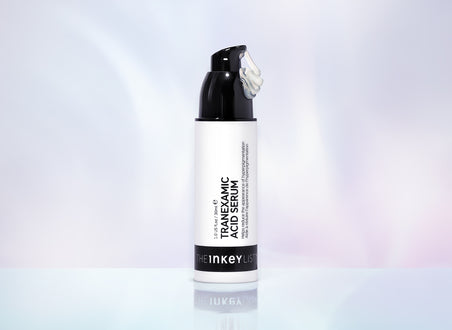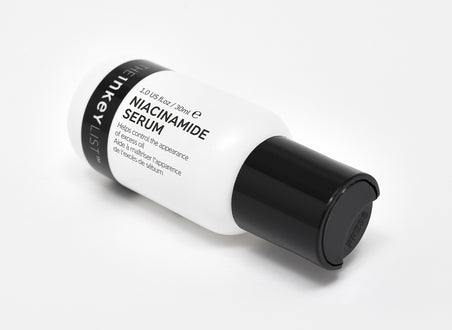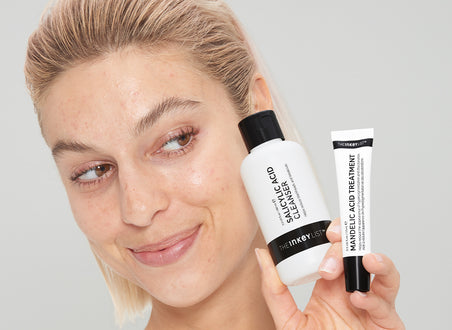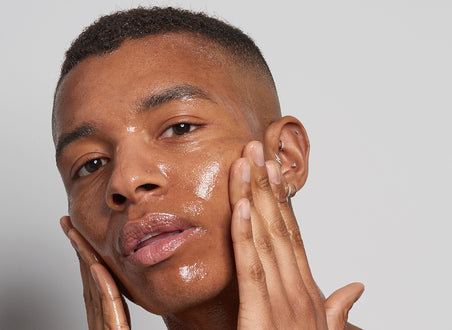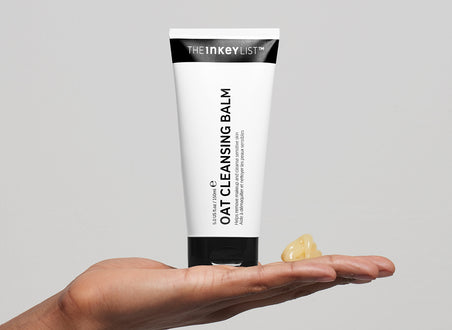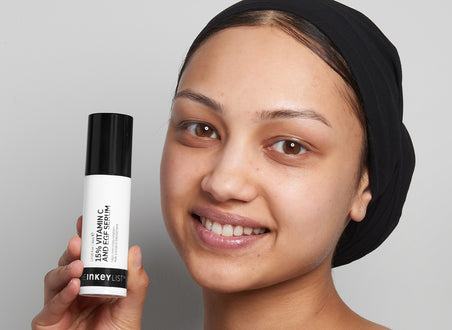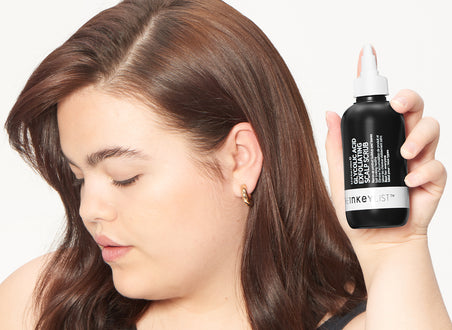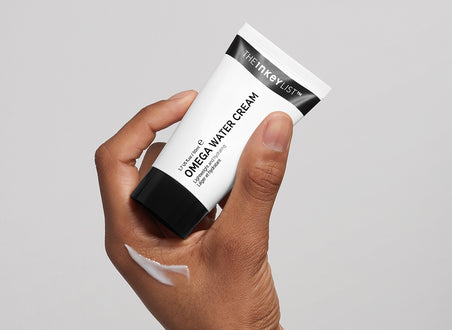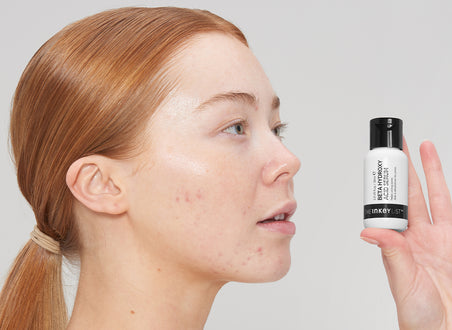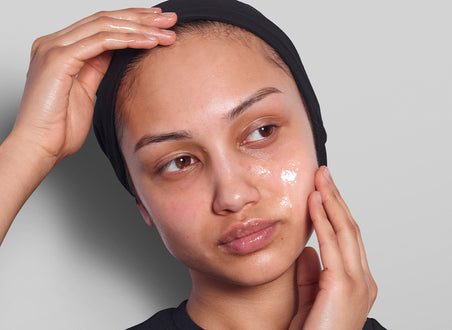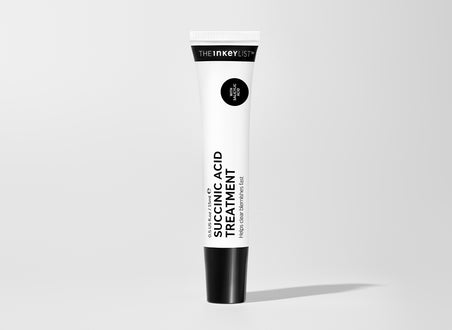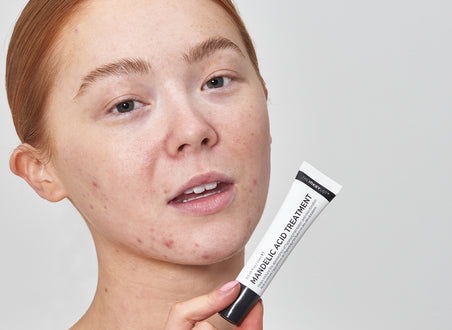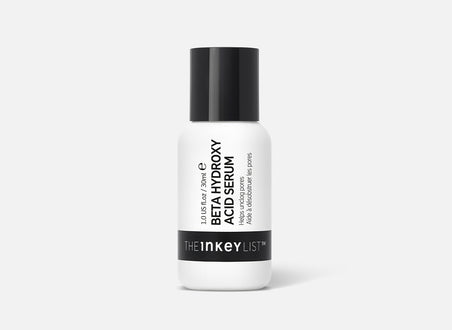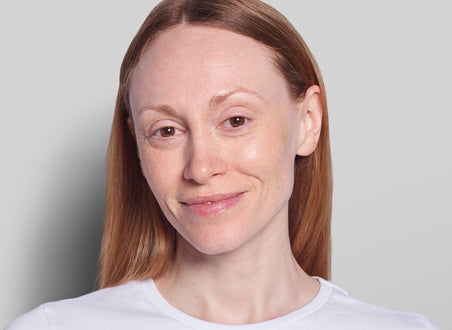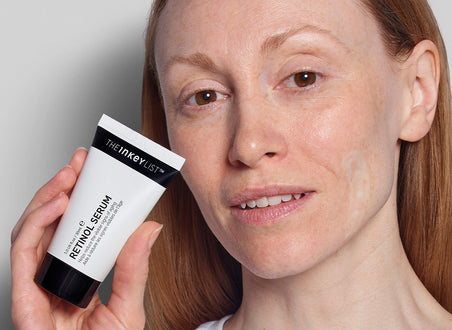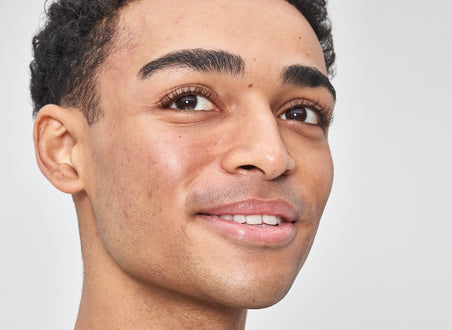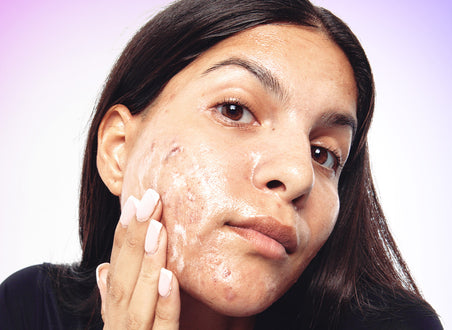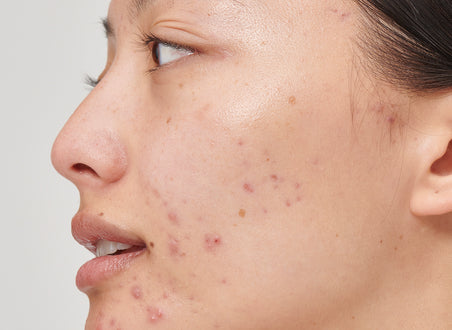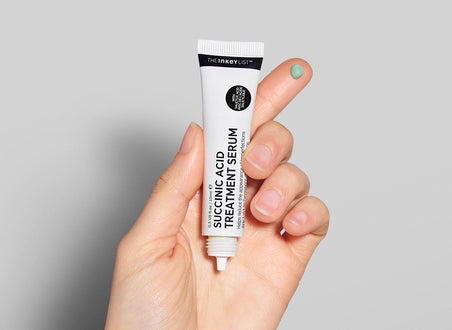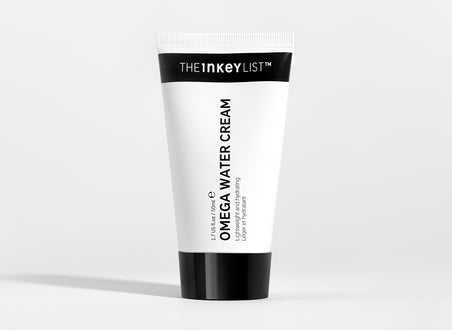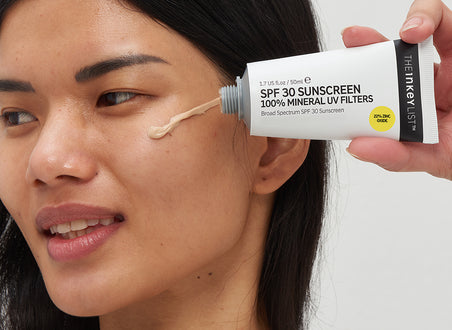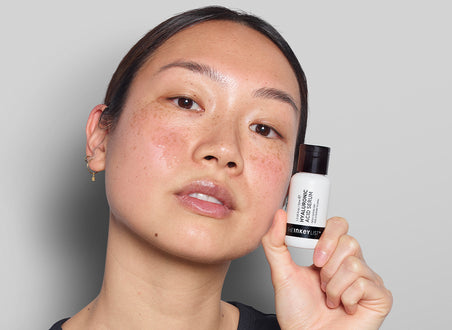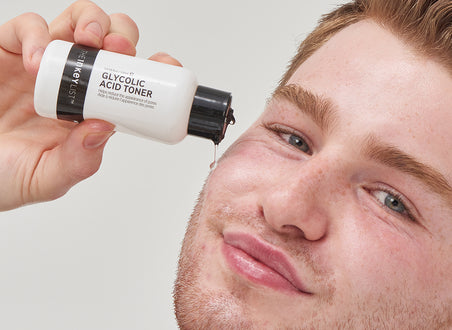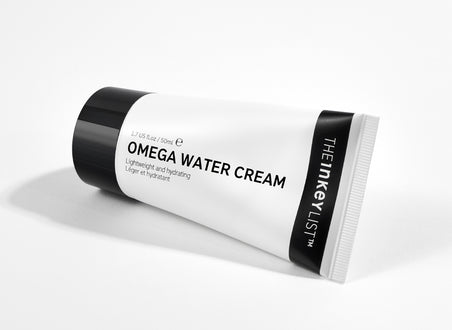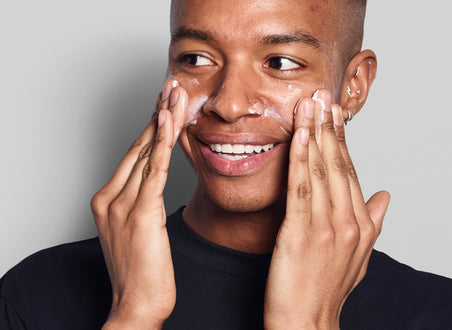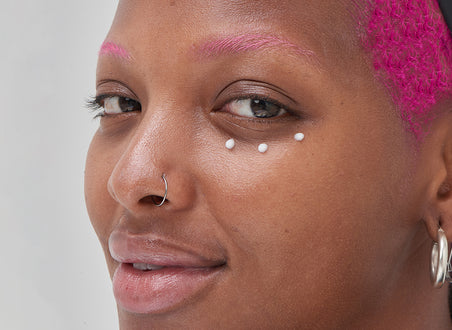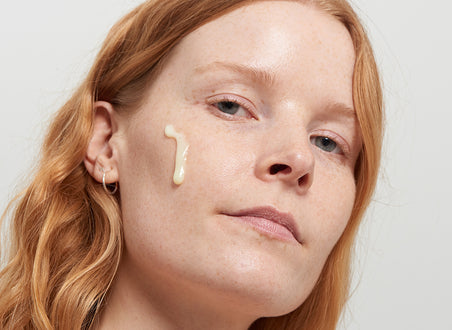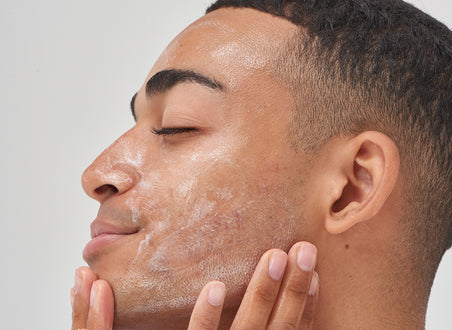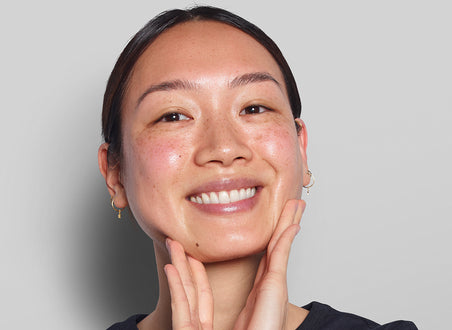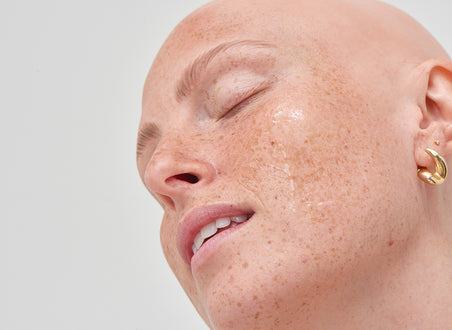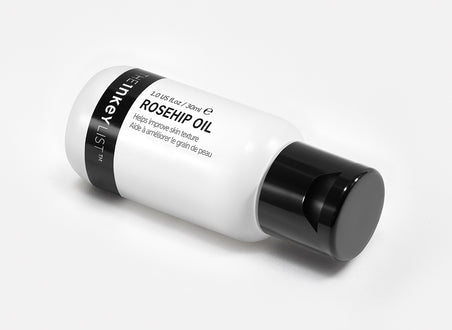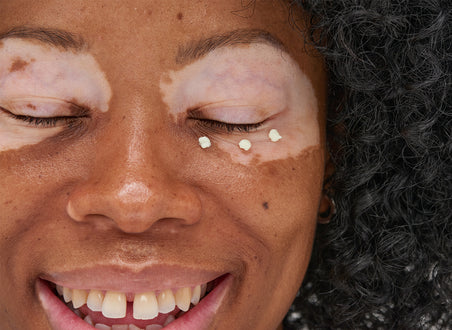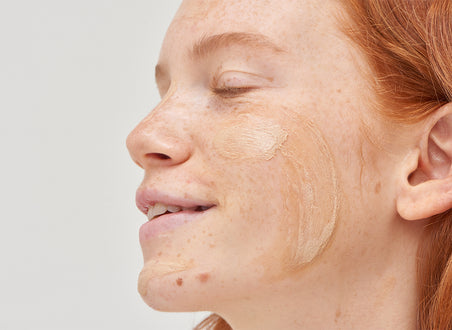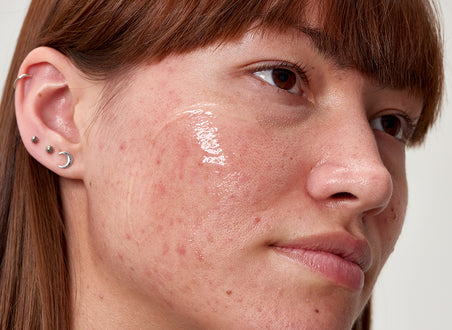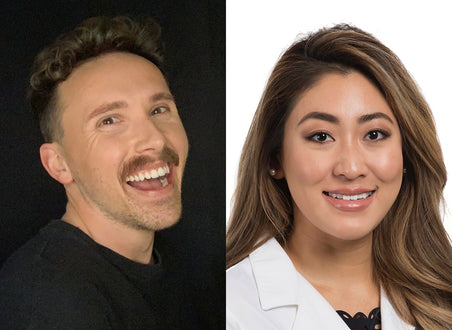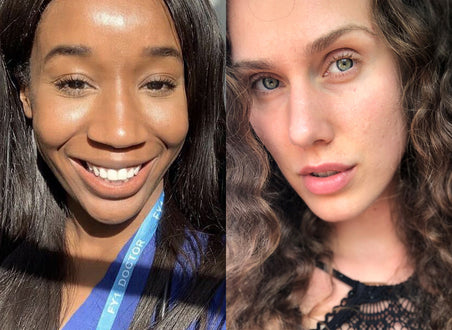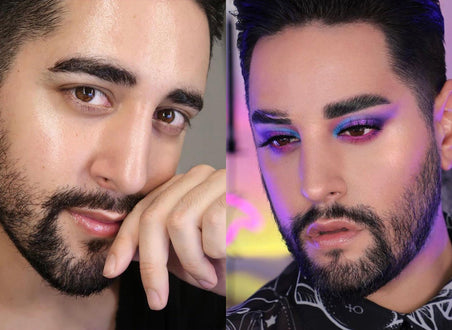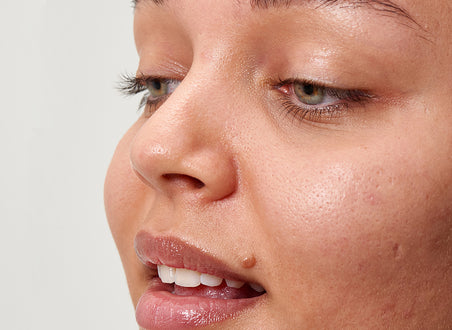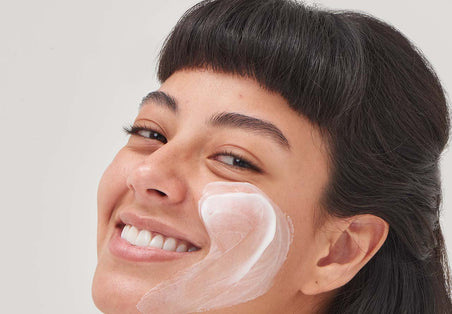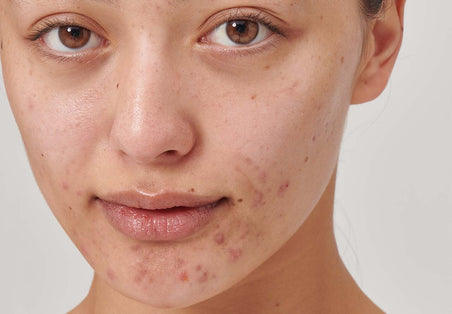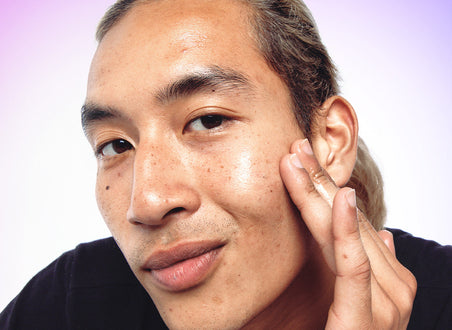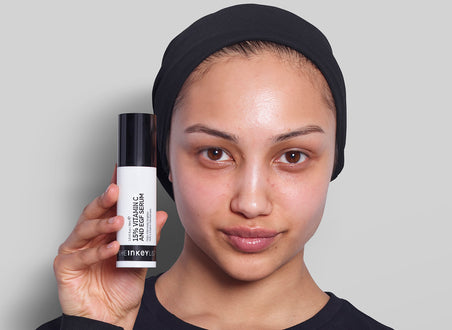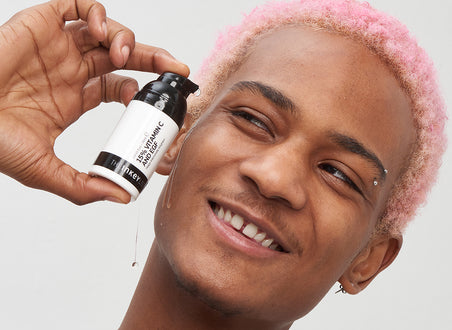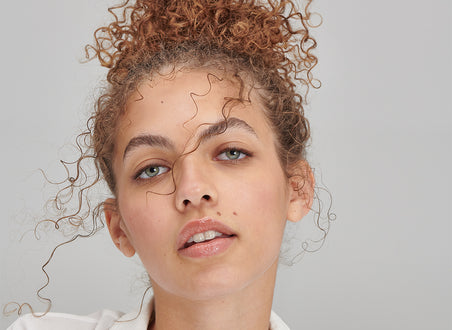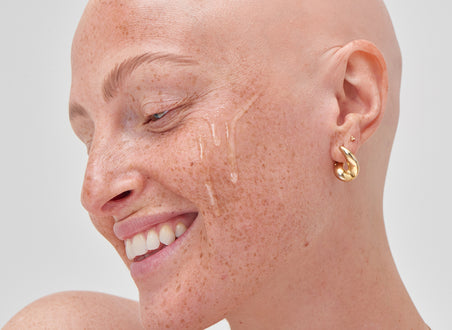Welcome to the INKEY Blog. Where we spread and share our skincare knowledge with you!
Selected filters:
A moisturizer is a must-have in any skincare routine. Right up there with an effective cleanser, a hydrating step, lotion, or oil can make all the difference for any skin type, and is a pillar in an effective regime. But with so many around and lots of conflicting advice, it can be tough to know how to pick, apply, and make the best of your moisturizer. Fear not; we’ve laid everything out that you need to know to make the process easier and more straight forward than ever.
Retinol is one of the most proven ingredients for improving texture, signs of ageing, and cellular turnover, but its potency means it must be used thoughtfully. Conflicting advice often oversimplifies retinol pairing, yet effective routines rely on understanding ingredient interactions, timing, and skin barrier support. Whether you’re starting with INKEY’s Starter Retinol or using our Advanced Retinal that works up to 11 times faster, the right layering approach ensures maximum benefits while protecting skin health. This guide breaks down the science behind retinol compatibility into clear, practical advice so you can use retinoids with confidence—not caution.
Ceramides make up 50% of your skin’s natural barrier — but not all ceramides work in the same way. With the rise of bio-active technology, understanding the difference between traditional and bio-active ceramides can be the key to unlocking stronger, smoother, more resilient skin.
In this guide, we break down the science behind ceramides, from the essential role they play in preventing moisture loss to how different types target concerns like dryness, sensitivity and fine lines. You’ll discover how bio-active ceramides enhance penetration and accelerate visible results compared to conventional formulations — and how to choose the right ceramide product for your skin type.
Overusing retinol or acids can leave your skin irritated, flaky, and far from glowing. Enter skin cycling — the dermatologist-approved method that alternates active ingredients with recovery nights to maximize results while protecting your skin barrier. Think of it as interval training for your face: smarter, gentler, and way more effective long-term.
Glass skin is more than a viral trend — it’s the ultimate sign of healthy, deeply hydrated skin. In this guide, we break down what glass skin really means, the key ingredients that support it (like hyaluronic acid, ceramides, and niacinamide), and the step-by-step routine that helps you achieve a smooth, luminous glow. With consistent barrier care and hydration layering, glass skin is an achievable reality — not an impossible standard.
Red light therapy has become a popular non-invasive treatment for skin concerns like fine lines, redness, acne, and dullness. Using specific wavelengths of red and near-infrared light, it helps stimulate cellular energy, supporting collagen production, healing, and overall skin renewal.
In this guide, we explore how red light therapy works, the benefits backed by research, and key safety considerations. We’ll also highlight effective skincare alternatives that can deliver similar results, including clinically proven ingredients like retinoids, vitamin C, peptides, niacinamide, and ceramides — with targeted INKEY List products to help you achieve healthy, glowing skin without investing in a device.
Retinoids are some of the most proven ingredients in skincare — but figuring out the difference between tretinoin and retinol can feel unnecessarily complicated. One requires a prescription, the other sits on the shelf of your favourite skincare store… yet both promise smoother texture, fewer fine lines, and brighter, healthier-looking skin. In this no-nonsense guide, we break down the real science behind tretinoin vs. retinol: how they work, what results you can expect, and why one might suit your skin, lifestyle, and budget better than the other. Whether you’re considering prescription-strength treatment or looking for an effective over-the-counter option, you’ll leave with a clear understanding of what matters most — and how to choose the best retinoid for long-term skin success.
Unlock scientifically-backed radiance with the power of exosomes, tiny cellular messengers that help improve hydration, texture and luminosity from the inside out. In this guide, you’ll discover how exosome technology works, a targeted 2-week skincare plan to achieve glowing, camera-ready skin, and practical morning and evening routines featuring key products like The INKEY List’s Exosome Hydro-Glow Complex. Whether you’re planning ahead or need last-minute glow tips, this article turns skincare science into actionable steps for your best skin yet.
Retinol has long been considered a no-go for sensitive skin—but modern skincare science tells a different story. With the right formulation and a gentle, strategic approach, retinol can deliver powerful anti-ageing benefits without irritation. The INKEY List Starter Retinol is designed specifically for reactive skin, helping you build tolerance safely while improving texture, tone, and radiance. This guide shows how sensitive skin can finally use retinol with confidence.
Retinol is one of the most effective ingredients for improving visible signs of aging, but for rosacea-prone skin it’s often approached with caution. Increased sensitivity, persistent redness, and a weakened skin barrier can make traditional retinol formulas feel overwhelming.
The good news? Advances in formulation mean retinol is no longer a one-size-fits-all ingredient. With the right concentration, supportive ingredients, and a gradual introduction, rosacea-prone skin can benefit from retinol without compromising comfort. This guide breaks down what to know, what to avoid, and how to introduce retinol in a way that respects reactive skin.
Standing in the skincare aisle, surrounded by retinol products ranging from $15 to $350+, it’s easy to assume higher price means better results. The reality? Retinol effectiveness has almost nothing to do with cost. This science-backed guide cuts through the marketing hype to reveal what actually makes retinol work, how to choose the right formula, and why affordable options can deliver clinical-grade results—without the luxury price tag.
Higher retinol percentages don’t guarantee better results — and in many cases, they do the opposite. Chasing strong concentrations often leads to irritation, disrupted skin barriers, and inconsistent use. The truth? A well-formulated 0.5% retinol used consistently can outperform a poorly stabilised 2% every time. In this guide, we break down why retinol percentage is misleading, what actually determines effectiveness, and how INKEY’s science-led approach prioritises stability, tolerance, and real skin results over marketing hype.
Smart skinimalism is the 2026 skincare trend redefining results through simplicity. Backed by science, this approach prioritises skin barrier health and multi-functional ingredients over excessive layering. Discover why simplified routines can reduce irritation by up to 40% and how to build an effective, evidence-based 3-step routine for healthier, more resilient skin.
Your skin is constantly communicating beneath the surface—millions of microscopic messages coordinating repair, hydration, and regeneration every second. These messages are carried by exosomes: nano-sized cellular messengers that tell your skin exactly how to respond to damage, stress, and daily wear. Now, this breakthrough science is making its way into skincare. Exosomes don’t just sit on the surface—they help enhance your skin’s own communication systems, supporting collagen production, barrier repair, and visible radiance from within. Think of them as your skin’s internal text messages, delivering precise instructions where they’re needed most. Discover how exosome technology is redefining skin health and why it represents a new era of smarter, more efficient skincare.
In the world of regenerative skincare, two ingredients are leading the conversation: PDRN and retinol. Retinol has long been the gold standard for skin renewal, backed by decades of research and proven results. But PDRN represents a new generation of skin regeneration—working with the skin’s natural repair processes to boost glow, strengthen the barrier, and improve resilience with minimal irritation.
In this guide, we break down how PDRN and retinol work, their key benefits, potential side effects, and how to choose the right option for your skin goals. Whether you’re drawn to the instant radiance and barrier support of PDRN Serum, or the time-tested anti-ageing power of Starter Retinol and Advanced Retinal, this comparison will help you decide which approach—or combination—makes sense for your routine.
Starting your retinol journey but worried about irritation? Meet the Moisture Sandwich Method - a gentle, skin-barrier–friendly way to ease retinol into your routine. By layering moisturiser before and after your retinol serum, this technique helps minimise dryness and sensitivity while still delivering visible results. Ideal for first-time retinol users or anyone with sensitive skin, it’s the smart, stress-free way to unlock smoother, firmer-looking skin without the fear of irritation.
Retinol’s golden hue is one of the most misunderstood features in skincare. In this guide, we break down the real science behind retinol’s natural yellow color, how to tell the difference between quality and oxidation, and why it won’t stain your skin. You’ll learn what yellow retinol actually signals about potency, how to spot when a product has truly gone bad, and what to expect from INKEY’s new retinol range—from the gentle Starter Retinol to the high-performance Advanced 0.05% Retinal.
Retinol works—but retinol paired with exosomes works harder. Learn how Exosome Hydro-Glow Complex primes your skin to maximize retinol performance, delivering faster cell turnover, visible brightening, and up to 82% reduction in fine lines.
PDRN (Polydeoxyribonucleotide) is one of skincare’s most talked-about regenerative ingredients—but is it really worth the hype? This science-led guide explores how PDRN works, what the research says about collagen and barrier repair, and the safety and ethical questions around salmon-derived formulas. We also look at next-generation alternatives that deliver regenerative results without compromising on values.
Retinol is one of the most proven ingredients for reducing signs of aging—but choosing the right one can be confusing. This complete guide breaks down how retinol works, the difference between retinol and retinal, and helps you find the best option for your skin using The INKEY List’s Starter Retinol Serum, Advanced 0.05% Retinal Serum, and Retinol Eye Cream.
Retinol vs bakuchiol is one of the biggest debates in anti-aging skincare right now, with experts split between proven performance and gentle, natural alternatives. This guide cuts through the noise with clear, science-backed insights into how each ingredient works and how they compare. The truth is, there’s no single winner—retinol delivers powerful, research-backed results, while bakuchiol offers a gentler option for sensitive skin. The key is choosing what best suits your skin, lifestyle, and tolerance.
Effective anti-aging doesn’t need a 12-step routine or luxury price tags—it needs the right science-backed ingredients used consistently. In this guide, you’ll learn what actually causes skin to age, which actives are proven to work, and how to build simple AM/PM routines for real results. No hype—just honest skincare that fits your life (and your budget).
Both retinol and retinal are powerful vitamin A derivatives proven to transform skin—but they’re not created equal. Retinal (also known as retinaldehyde) works faster than retinol thanks to fewer conversion steps, meaning quicker, more visible results for experienced users. Whether you’re just starting your vitamin A journey or ready to level up, understanding the difference helps you choose the right formula for your skin type, tolerance, and goals. From gentler beginner options to advanced, fast-acting solutions, here’s everything you need to know about retinol vs retinal—and how to use them for your best skin yet.
Struggling with persistent breakouts, pigmentation, or excess oil? The 360 Skin Clearing Serum is here to change your skincare game. This all-in-one formula is designed to visibly improve blemish-prone skin by targeting every stage of a breakouts.
Meet your new hydration go to. Hydro Surge Dewy Face Mist gives you instant glow and lasting moisture in one refreshing spritz. Lightweight, makeup friendly and perfect for on the go, it keeps skin looking fresh and feeling hydrated all day. Mist up anytime before makeup, post gym, mid flight for skin that looks dewy not dull.
Meet Hydrating Cream-to-Milk Cleanser — your new go-to for soft, balanced, and hydrated skin. Powered by 5% Rice Milk and Hyaluronic Acid, this gentle cream transforms into a silky milk to melt away makeup and grime without leaving skin dry or tight. Think deep cleanse, zero drama. Just calm, hydrated skin that feels good all day.
Let’s get into it: are you familiar with Exosomes in skincare? Know what they do––and most importantly, the power they have when it comes to skin? Whether you are or not quite, the at-home skincare game is about to change.
Exosomes are redefining skincare by working at the cellular level to support collagen production, hydration, and skin renewal. Once used primarily in medical research, this advanced technology is now available in plant-based skincare formulations that help improve firmness, calm inflammation, strengthen the skin barrier, and deliver visible glow. This guide explores how exosomes work, their key skin benefits, how to use them effectively, and why plant-derived exosomes are shaping the future of skin rejuvenation.
Healthy, radiant skin starts with proper hydration—but do you know the difference between hydration and moisturization? While hydration replenishes water in the skin, moisturization locks it in to prevent dryness. If your skin feels tight, dull, or flaky, it may be craving a hydration boost! Discover how hydrating ingredients like Hyaluronic Acid can plump and refresh your skin, leaving it soft, bouncy, and glowing.
Want skin that looks fresh, plump, and radiant? Hydration is the key! When your skin lacks water, it feels tight, looks dull, and fine lines become more visible. But with the right hydration routine, your skin stays smooth, bouncy, and ready to glow. From morning to night, discover how to keep your skin hydrated and protected for a complexion that always looks its best. Ready to give your skin the moisture it craves
Backed by extremophile science, ectoin helps protect, hydrate, and strengthen the skin barrier against daily environmental stress. In this comprehensive guide, we break down exactly what ectoin is, how it works at a cellular level, and why dermatologists are calling it a game-changer for barrier health and long-lasting hydration. You’ll learn how ectoin compares to hyaluronic acid, which skin types benefit most, and how to use it effectively in your routine. Plus, we explain how INKEY’s Ectoin Hydro-Barrier Serum harnesses this innovative ingredient to support stronger, more resilient skin—now and over time.
Think of the epidermis as your skin's suit of armour—its first line of defence. The condition of your skin’s barrier is closely tied to the overall health and appearance of your skin. When strong and healthy, your skin looks hydrated, plump, and glowing. When compromised or damaged, it may appear dull, uneven, or sagging, with visible fine lines and wrinkles.
There are a lot of myths and misconceptions around skin dryness which is not quite as simple as just a lack of water. Skin dryness is classified more as skin type as opposed to dehydration which is more of a skin state resulting from external factors and requires a different approach of care. Find out more and what INKEY products target dry and damaged skin.
Enter NEW Ectoin Hydro-Barrier Serum. This is not just another barrier serum; this is leading barrier science now with advanced hydration. Read on to get the lowdown on the hottest launch of 2025...
Think hydrating is only a daytime thing? We’ll let you in on a secret, it’s even more powerful in the evening.
Here at The INKEY List we’ve always understood the power of hydration because we know that healthy skin starts with hydrated skin.
Experiencing blemish-prone skin? You’re not alone. Did you know that breakouts will affect 90% of the global population at some stage in their lives? Whether it's blemishes or breakouts, pre, during or post, we’re here to help you at every stage and get you on the right path to clearer-looking skin.
With the launch of INKEY Body, we’re here to show you there’s a better way to exfoliate, and it’s so easy to do you can make it part of your daily routine with no extra effort. Get ready because your best body skin is just a glide away… INKEY SAYS EXFOLIATE.
With the launch of INKEY Body we’re here to show you that there’s a better way to exfoliate, one that targets and improves multiple body skin concerns and is so easy-to-use, you can add it to your daily body care routine with no extra effort. INKEY SAYS EXFOLIATE!
Keratosis pilaris, ingrown hairs, body breakouts and rough texture are common—and often misunderstood. This guide explains why these concerns happen, why traditional scrubs and aggressive exfoliation usually fall short, and what actually works instead.
You’ll learn the science behind glycolic acid and how clinically proven chemical exfoliation can improve skin texture in as little as 7 days. We’ll also show you exactly how to use Glycolic Acid Exfoliating Body Stick, with clear, practical guidance for treating different body areas and concerns, plus UK-specific advice to help you get consistent, visible results.
Salicylic acid (BHA) is one of the most reliable, science-backed ingredients for tackling acne, blackheads, and excess oil—because it’s oil-soluble, it can work inside pores (not just on the surface). In this guide, we break down exactly what salicylic acid is, how it works, and how to use it safely for clearer, smoother skin, including tips on layering and what to expect during the adjustment phase. You’ll also find product guidance for every stage of blemishes, from our bestselling 2% Salicylic Acid Cleanser and advanced 360 Skin Clearing Serum to fast-acting Hydrocolloid Invisible Pimple Patches proven to reduce breakouts in as little as 4 hours.
Without question, if you are a parent of a tween or young teen, you might have seen their newfound fascination with teenager skincare. What is concerning for us at The INKEY List, is that many skincare products are not created with this age in mind. This article will share our point of view and the type of products we recommend for teenage skincare routines.
Is your skin feeling more dry, dull and dehydrated than usual? Are you suffering with increased sensitivity? Are you noticing your skin is breaking out? If so, you’re not the only one. Inconveniently, alongside the cozy nights and hot chocolate, winter brings the cold weather and lack of humidity which, for some people, can cause issues with their skin.
Anti-aging isn’t about fixing wrinkles once they appear—it’s about starting smart, early, and with the right ingredients. From the moment collagen levels begin to decline in your twenties, your skincare choices matter. This in-depth guide explains when skin aging really starts, how prevention differs from correction, and exactly which ingredients to introduce at every stage of life for healthier, younger-looking skin long term.
Have you started to notice signs your skin is changing? Perhaps it’s a little slacker or maybe a few fine lines where you didn’t used to have them? Whatever you’re feeling, we’ve got the product for you.
Welcome to the art of mixing makeup with skincare, a new approach that gives you the best of both worlds - think maximizing your results with minimal effort.
Plump lips are back on trend but, if you’re searching for the ultimate fuller, healthy-looking lips without compromising your lip skin barrier or opting for filler then read on.
In this article, we'll explore the science behind this innovative lip balm, discovering why it's essential for achieving hydrated, smooth, and naturally plumper-looking lips. No filler, no filter, just fuller!
In this blog post, we’ll explore the different skin types and offer straightforward tips to help you identify your own. Additionally, we’ll reveal the top recommended ingredients recommended for your personalized routine.
There’s no question too big or too small for our in-house team of experts! We’re taking a look at your most asked questions so we can help share our INKEY knowledge even further.
Let’s face it, dealing with blemishes can be frustrating, but with the right skincare products, you CAN effectively combat breakouts and achieve clearer, healthier skin. In this blog post, we will discuss several recommended product types
There is some serious confusion around sun protection and the importance of wearing sunscreen. We’re here to educate as many people as we can on all things suncare. From UV rays, to the best ways to reapply – Sun School is here to help.
Starting retinol doesn’t have to be intimidating. With so much conflicting advice, it’s easy to feel unsure about when to start, how to use it, and what to expect. This beginner-friendly guide breaks it all down into the 5 essential things you need to know – from how retinol actually works and when you’re ready to start, to managing the adjustment period, choosing the right strength, and following the non-negotiable safety rules.
At The INKEY List, People and Planet have always been at the heart of what we do and over the last two years we have been actively working towards becoming a certified BCORP and to create more moments of knowledge powered change.
Did you know you could use some of INKEY’s most loved skincare products on your body too? We’re all about simplifying skincare so what better way than using multi-purpose products! Below are the top INKEY products to use on your body and hacks to incorporate in future self-care routines.
We’re incredibly lucky at The INKEY List that we’re co-founded by an empowering female leader and successful business woman, Colette Laxton, so we thought who better to share her own experience of being a woman in business and her recipe for success.
Unlike glass, buttery, or dolphin skin, which aims to make your complexion so luminous it could have been modeled from glass by the skin gods, cloud skin uses a strategic mix of skincare and makeup to achieve a dreamy and ethereal glow-from-within look.
The idea behind it is simple: active ingredients can penetrate the skin more effectively when it's hydrated. This simple technique involves applying back-to-back skin care products without letting them dry to achieve maximum absorption.
Our award-winning Oat Cleansing Balm is a rich cleansing formula designed to melt away makeup and impurities without drying the skin. The key to making the most out of this product is knowing how to best apply it in your routine.
Hyaluronic acid is skincare’s hydration hero — and this guide explains exactly why. Learn what it is, what it does for your skin (from lasting hydration to a plumper look), and how to use it properly for the best results. Plus, discover the easiest ways to build it into your routine with affordable, high-performance picks from The INKEY List.
Our Polyglutamic Acid Serum is a powerful hydrator for the skin's surface, locking in moisture and helping the skin appear instantly smoother. In fact, it can hold 4x more moisture than Hyaluronic Acid—so it’s a must for dry skin, especially in the winter.
Although our products are designed to work all year long, the change in weather means readjusting our current skincare routine to best combat the colder temps and help avoid and target dry skin.
If you struggle with breakouts, you’ve probably heard of these ingredients before: Salicylic Acid and Benzoyl Peroxide. Both are key for keeping skin clear and smooth, but they do so in totally different ways.
Today, we’re breaking down the differences between Alpha Hydroxy Acid (AHA) and Beta Hydroxy Acid (BHA).
If your skin feels rough, looks dull, or gets stuck in a cycle of congestion, glycolic acid could be the game-changing ingredient you’ve been missing. From refining texture and boosting radiance on the face (hello, Glycolic Acid Toner) to smoothing stubborn body concerns like rough elbows, bumpy arms, and keratosis pilaris (meet the Glycolic Acid Exfoliating Body Stick), this powerhouse AHA works by gently dissolving the bonds that hold dead skin cells in place—revealing fresher, brighter skin underneath. In this guide, we’ll break down exactly how glycolic acid works, the proven benefits you can expect, and how to use it safely and effectively so you can get real results without the guesswork.
If your skin feels persistently dehydrated despite using moisturizer, it may be lacking water rather than oil. Hyaluronic acid is a naturally occurring molecule in the skin that plays a key role in hydration, barrier support, and skin elasticity—but levels decline steadily with age and environmental stress. This article explains how to recognise the signs your skin may benefit from hyaluronic acid, why dehydration can affect all skin types (including oily and sensitive), and how incorporating a hyaluronic acid serum can help improve skin comfort, radiance, and overall resilience.
This article explains what retinol does for your skin and why it remains one of the most effective skincare ingredients available. We explore how retinol supports collagen production, improves skin texture and radiance, fades hyperpigmentation, helps manage acne, and can be used safely on delicate areas like the eye contour. You’ll also find guidance on choosing the right strength, what results to expect over time, and how to introduce retinol into your routine for consistent results
If you’re using hydrating products and not seeing results for dry skin, there are numerous reasons why this could be happening. Let’s take a look at the 5 best ingredients for dry skin.
Meet, Real Results with INKEY. This is our dedicated series where we pass off the mic to our very own customers, who will share their reviews and recommendations on some of our products.
What exactly IS skin cycling? Who is it best suited for and why are people switching their skincare routine to this pattern?
Not sure where to start with moisturizers? We don’t blame you. This lightweight, oil-free moisturizer is the answer to everyone’s moisturizer questions.
Whether you’re feeling burnout from holiday spending, trying to combat the rise of inflation, or looking for ways to be cost-efficient in the new year–we’re sharing our top 5 ways to save money without compromising your skincare routine.
Read on to learn more about the three skincare resolutions we’re setting out for ourselves this year and join us on the path to healthy, glowing skin.
At The INKEY List, our top priority is providing our community with high-quality skincare and scalp care at an accessible price. We also promise to always be transparent and honest with you, which is why we are sharing that starting 1st January 2023, you will notice some of our prices increasing. Here’s why.
It’s never too late to stop using the random bar soap in your shower on your face and get advice on how to take better care of your skin. We make skincare simple to understand and easy to use.
Azelaic Acid is a multifaceted active ingredient with multiple benefits that can target several concerns, proven to be beneficial for blemish prone, rosacea prone and redness prone skin. Find out more about the benefits of Azelaic Acid, how to use it and what other ingredients you can use to help reduce redness in the skin
So many things can cause facial redness—genetics, skin type, the environment, stress, breakouts, etc. With the right skin care formulas, you can not only soothe dry, itchy skin but you can prevent redness from happening in the first place.
Meet, Real Results with INKEY. This is our dedicated series where our customers will share their reviews and INKEY products recommendations. This week we look at before and after transformations of acne on the chin and cheek areas.
If you’ve been battling oily skin with harsh cleansers, strong toners, or skipping moisturiser altogether, there’s a good chance you’re accidentally triggering even more oil. The truth: sebum is protective — the goal is balanced production, not total elimination. This comprehensive guide explains the science behind oily skin and highlights four proven ingredients that help control oil without over-drying: niacinamide, salicylic acid, dioic acid, and omega fatty acids. You’ll also get a complete morning and evening routine with INKEY List product recommendations, plus the smartest way to build it gradually to avoid irritation and rebound shine.
Our top five tips for getting the most out of your skincare routine. Make your skincare products work more effectively, get better results, and save some money in the process.
If you are looking for an ingredient that has dual benefits of effectively moisturizing and exfoliating dead skin buildup simultaneously, look no further than Urea. At The INKEY List, we believe it is the next trend ingredient! For those with dry or rough skin texture or those that are prone to eczema or psoriasis, we have your Solution.
This science-backed guide explains exactly how retinol improves acne scars, dark spots, and red marks — and how to use it safely for real, visible results. Learn the difference between PIH, PIE, and true acne scars, how retinol works at a cellular level, and how to choose the right INKEY retinol strength for your skin. With step-by-step routines, realistic timelines, and clinically proven solutions, this guide gives you everything you need to transform post-acne skin with confidence.
Have you ever been so excited to commit to a skincare routine and then left wondering when you will see results? We've been there and we'll explain what to look out for and what to expect when perfecting your skincare routine.
Want to streamline your skincare routine, but still see results? Follow these five steps when investing in your daily regimen.
Consider us your token skincare friend. Meet, Real Results with INKEY. This is our dedicated series where we pass off the mic to our very own customers, who will share their reviews and recommendations on some of our products.
Phytic Acid is an antioxidant Alpha-Hydroxy Acid (AHA) derived from micro-algae. It’s extracted from the natural environment first, then scaled up synthetically in bioreactors, which makes it a sustainable resource in the skincare industry.
Why does it seem like products become less effective over time? There are a few reasons why this might be the case. We’ll break down the most common reasons we get this question below.
While there’s no need to completely redo your entire routine, warmer weather and longer days can change what your skin needs this time of year. Here's our top summer skincare tips.
Clogged pores occur when oil and dead skin cells build up inside of pore linings and they expand to accommodate it. Here are our derm-recommended tips for dramatically smaller-looking pores.
Not as well-known as Hyaluronic Acid, Polyglutamic Acid ("PGA"), is believed to have 4x greater moisture retaining benefits than HA. If you have dull, dry, or dehydrated skin, you should consider incorporating Polyglutamic Acid into your skincare recipe.
Collagen within skincare has been a talking point within the beauty industry as a whole. But what does collagen actually do, and how can you include it in your regimen?
Keeping your skin pH balanced and at a consistent level will help support healthy skin. The products you use in your skincare routine can have an impact on your pH levels, along with other factors, so it’s useful to understand what you can do to maintain a healthy balance.
For some, emulating the glowing, radiant look can feel impossible, especially if you experience dryness, dullness, or blemishes. However, at the core of glowing skin is a good, comprehensive skincare routine built around effective cleansing, suitable treatments, and comforting nourishment.
The scalp is perhaps one of the most easily forgotten areas of the body – especially when it comes to self care and T.L.C. That said, many of us are beginning to come around to the fact that the scalp is just as important as the skin on the rest of the body, as well as the hair itself.
It’s fair to say that acne is usually associated with oily skin, or those with normal to combination skin who also experience excess oil. It is less common, but dry skin types can absolutely experience acne, and it can be a hard situation to address – particularly when deciding which skincare to use.
Plant-powered, gentle, and clinically proven — bakuchiol is redefining anti-aging. This complete guide explores how the plant-derived retinol alternative delivers smoother, firmer, more radiant skin without irritation. Discover the science behind bakuchiol, its benefits for sensitive skin and pregnancy, how it compares to retinol, and how to choose the right anti-aging approach for your skin’s needs — all while respecting your skin’s natural balance.
Niacinamide (vitamin B3) is one of skincare’s most researched ingredients—and for good reason. It works on multiple pathways at once: balancing sebum, supporting the skin barrier, soothing inflammation and helping improve the look of dark spots and fine lines. In this guide, we break down what niacinamide is, what it actually does, and how to layer it in your routine for clearer, more balanced skin.
They may feel like a quick and efficient way to cleanse the skin but could face wipes actually be doing more harm than good?
Skin hyperpigmentation can appear in several different forms, and it can sometimes be difficult to know what has caused it and where it has come from. Read on to discover which type you may have, along with the best ingredients and products to target the condition.
Acne is one of the most common (not to mention frustrating) skin concerns, but many people feel confused about what causes it and (most importantly) what you can do about it. With a consistent routine and effective ingredients, you can fight acne and maintain clear skin—all for under $19.
What if one product could totally transform your skin? Even better, what if it could do it in 30 days? Meet the $11.49 best-selling Hyaluronic Acid Serum.
We don’t know who needs to hear this, but effective skin care doesn’t have to be expensive. If you’re paying more than $19 for these five ingredients—you’re paying way too much.
Tranexamic Acid is our go to ingredient to treat pigmentation concerns - whether that’s uneven tone, melasma, post-inflammatory hyperpigmentation, dark/light patches or scarring from acne and breakouts. Find out more about the benefits of Tranexamic Acid, how to use it and what other products you can use alongside to reduce the appearance of hyperpigmentation and scarring.
When we adjust and update our skincare routine regularly, it can mean some products get pushed to the back of the shelf. Whilst most products can last a number of years unopened, skincare products do also have a recommended use by date.
The wide range of acids available within skincare all come with a range of benefits that differentiate them from each other. Learn more about the use of acids in skincare, the differences between them and which acids are suitable for you.
Pilling refers to a residual build up on the surface of the skin from the application of cosmetic products, make up or skincare. It occurs when something is preventing a product being absorbed into the skin and leaving small blobs, gritty balls or flakes. Find out what can cause pilling and how to prevent it when applying your skincare routine.
The product and its stage in your routine can define the amount that we need to apply to the skin. We’ve created this handy sizing reference guide for each stage of your skin care routine of how much to apply.
The term antioxidant appears everywhere, from our food to our face creams. Antioxidants are beneficial to our bodies because of the role they play in combating imbalance of free radicals and promoting good health - this includes on the skin. Learn about what INKEY list products contain antioxidant properties
There’s a plethora of things that can cause scalp itchiness and flakes including build up of product and dead skin cells, and excess sweating, which can clog pores and accelerate build up itself. Dandruff is also a very common cause of itching and flaking, caused by a high rate of shedding skin cells at the scalp, which is also often paired with excess oil production. Find out our tips on how to treat an itchy or flakey scalp here.
You may be familiar with the terms ‘clinically tested’ and ‘dermatologically tested’ associated with skincare which are two ways brands can deepen their testing of their products. But what do these mean? Find our more here
If you’ve been exfoliating more than usual or using several actives in one go (think acids, retinols etc), you may experience certain symptoms that will point to over-exfoliation. The most obvious symptoms include redness and irritation at the skin’s surface, which may also manifest through burning and inflammation. Learn how to prevent over-exfoliation and how to take care of skin that has been over-exfoliated
Investing in skincare (whether it’s money or time) means putting your hope and faithtrust into products to really make a difference to skin. But how long should you give them to make a difference? Find our more in our latest blog
Succinic acid is naturally anti-inflammatory and antimicrobial, meaning it works well to curb acne symptoms, where skin suffers redness, irritation and inflammation. Learn more about the benefits Succinic Acid has and how to use it in your skincare routine
Introducing your new hyperpigmentation hero - Mandelic Acid. A member of the Alpha Hydroxy Acid family, we’ve formulated this gentle treatment to target marks and scarring caused by breakouts as well as pigmentation concerns.
Congestion in the skin can be a precursor to acne and breakouts. We often receive your concerns around blocked pores but let’s explore skin congestion, its causes and ways to prevent it.
Keeping pores clean and clear is a fundamental objective within most skincare routines - whether it’s to reduce breakouts, brighten the tone or even the texture. Whatever your reason, there are varying degrees of treatments and products available to serve this cause - including the classic pore strip. We explain how pore strips work, how they can cause damage to the skin and some INKEY alternatives you can use to unclog pores and get rid of blackheads
It can be tempting to reorganise your routine and incorporate your new additions straight away - BUT we have some important advice which your skin will thank us for. Learn more about why it's important to patch test before using new products and how is best to perform a patch test to avoid any risk of irritation.ski
Whilst it’s typically seen as a condition that dominates the hormone charged teenage years, acne isn’t age discriminatory and can also appear in its adult form age 25+ and even into the 30s and 40s. Learn more about what causes acne and how to target and treat adult acne.
Acne is one of the main concerns we hear about at askINKEY. Prevention is the best cure for acne, here’s our top tips to help you treat your breakouts.
Navigating the world of acne can be a maze of different types and manifestations - from nodules to papules and a variety of comedones in between. To treat effectively, it’s important to know what you’re working with first. Learn more about the types of acne and the INKEY List product that can help you achieve your clearest skin.
However tempting it is, popping pimples can do more damage than good if extractions are not done professionally. Blemishes closer to the surface of our skin such as whiteheads and blackheads come with less risk factor than deeper rooted and inflamed breakouts but can still impact the healing process and spread bacteria. However tempting it is, popping pimples can do more damage than good if extractions are not done professionally.
It’s a common skincare myth to assume that moisturizers and oils will increase the shine on already oily skin types and add to acne breakouts. Before you skip this essential step, we explore how these products can work with your skin to actually balance oil production as opposed to adding to it.
Contrary to popular belief, SPF (sun protection factor) is not just for the summertime. While the Summer time is of course an important time of year to be extra diligent with sun cream application, you should really be applying yours year round, come rain or shine. Learn more about the benefits of sun protection here.
Rather than a skin concern like dehydration, ‘combination’ is a skin type, just as oily and dry are. It is characterized by oily, dry, and even some ‘normal’-feeling areas of the face, meaning it can often feel a little harder to treat as a whole. Find out how you can tell if you have combination skin, what causes it and the best INKEY List products to use in your skincare routine.
Toners are an excellent step to add into your routine as they work to deliver a range of benefits to skin and come in all different forms. Learn what a toner is, how to use one in your routine and more.
There are so many different ways to store skincare these days, but after you’ve decided the type of shelving unit or boxes you’d like to suit your aesthetic, there are certain rules to bear in mind when deciding where to house them. Find out more here.
Whatever workout you’re about to take on, we’d recommend going into your session with a fresh, clean face and once done, helping your skin return to its' cleansed and balanced state. Find out what we recommend to use before and after a workout.
Dark circles under the eyes tend to be a tell-tale sign of a lack of sleep and fatigue but can also be indicators of overall imbalance to your wellbeing. Located beneath the lower lid and accompanied puffiness, they can appear as a shadow from puffy eyelids or as a dull coloring and/or sunkenness beneath the eye. Find out which INKEY List eye creams are best suited to target dark circles here.
When we think of the microbiome, the word may draw us to the world of digestion and gut health, but what about the microbiome of your skin? Learn what a Microbiome is, what can cause disruption to your Microbiome and what you can do to support it to achieve your best skin.
Facial hairs and their follicles are a fundamental part of our skin’s structure. Connected to the sebaceous glands which produce oil, facial hair can create its own array of skin concerns requiring some adjustments and additions to our overall facial routine. Typically, it’s advisable to maintain your normal skincare regime through to the skin beneath the facial hair but there's some extra attention you can give these areas to keep skin beautiful beneath the beard in our latest blog.
The skin on our neck often gets grouped in to our facial routine or receives a dose of our body care products but can often be neglected as an independent area of attention. Unfortunately, the neck is a key place that shows the signs of ageing such as fine lines, wrinkles and uneven texture as well as hyperpigmentation and discoloration - so it can be worth isolating for tailored TLC. Find out what products can be used to target the delicate skin on your neck.
When building your routine, you’ll likely come across serums as a way to incorporate key active ingredients but what exactly are they and how can you use them? Find out more about The INKEY List serum collection and which one is suited to your skin goals.
We recognise our moisturizer as the essential finale of our skincare regime but often overlook the moisturizing facial oil which can add an extra layer of benefits to hydrate, protect and nourish the skin. Find out about the benefits of using a facial oil moisturizer and the INKEY List products you can easily incorporate into your skincare routine.
There are a number of factors which can determine when under-eye wrinkles begin to appear, but generally speaking, many people tend to see them first forming in their late twenties and early thirties. This is when the skin’s production of collagen and elastin starts to slow down, making wrinkles and other lines more likely to show up. Learn more about what you can do to prevent and treat under-eye wrinkles here.
When we think of pollution, many of us will likely think of a scary, big-city problem that only really impacts high-flying office workers and those living in built-up areas. But these days, pollution particles are everywhere, including in more rural areas, surrounded by countryside. Read more on pollution and what INKEY List products you can use in your routine to keep your skin safe and protected from pollution
There are certain tweaks you should make between your AM and PM regimes to get the most out of your skincare. A night-time skincare is more focused on washing away the remnants of the day, and prepping skin to repair overnight with certain treatments and active ingredients. Learn about what happens to skin overnight and what products you should be using in your PM skincare routine to achieve your skin goals.
Pregnancy can turn even the most confident skincare lover into an anxious ingredient-checker. But here’s the reassuring truth: you don’t need to sacrifice results for safety. With the right ingredient knowledge, pregnancy-safe skincare can be just as effective—if not more so.
In this guide, we break down how pregnancy hormones affect your skin, which ingredients to avoid, and which clinically proven alternatives truly work. From niacinamide and vitamin C to azelaic acid and ceramides, discover how to build a simple, effective routine using pregnancy-safe formulas from The INKEY List—so you can care for your skin with total confidence throughout your pregnancy journey.
Dr Zion and askINKEY’s Tom walked through a 5-step routine sharing their top tips on how to best treat your acne.
Cassandra Bankson & Dr Kemi share some amazing tips to help better treat your skin in the winter months and walk us through a step by step routine that you can try at home!
Robert & James Welsh share their 5-step routine to creating the perfect makeup base. They reveal their favourite INKEY products and give some insider tips for prepping your skin for makeup.
Whilst pigmentation in the skin is natural and what forms our glorious spectrum of skin tones, overproduction or underproduction can cause patches, spots and unevenness. Hyperpigmentation specifically is when too much Melanin is created as a result of scarring, inflammation, hormones, sun exposure or ageing. Learn how to reduce hyperpigmentation and the ingredients that are best suited to tackle this common skin concern.
When it comes to anti-ageing, peptides are a powerful ingredient that you may have heard of, but what are they? Peptides, also known as polypeptides, are amino acids which form proteins in the skin. Find out more about Peptides, how they can be beneficial in your skincare routine and what INKEY List products contain this super ingredient.
Stressed out skin can manifest in many ways, unfortunately. As stress can impact the skin’s natural protective barrier, there can be signs of dryness and dehydration, as well as inflammation and itchiness. You might also notice everything from pigmentation to dullness, and of course, there is the chance breakouts may appear. Learn what you can do to target stressed skin and what INKEY product are best suited to calming stressed skin.
Dehydration is incredibly common, but many find it hard to distinguish and thus to treat effectively. Our simple guide explains everything you need to know about dehydrated skin, in easy-to-understand, bite size pieces of information.
We have heard the research surrounding the impact of blue light on our sleep health, wellbeing, attention span and eyesight but how can the light from our devices and screens be impacting the health of our skin? Find out what blue light is and the key INKEY LIst ingredients that can help protect and repair against blue light effects on the skin.
The texture of our skin can be a primary concern and range from bumpiness to dry patches or pitting. Out of balance skin texture can appear dull, dry, patchy and uneven. Learn about the approaches to help even the texture of the skin by incorporating various tips and INKEY List products in your skincare routine.
Shiny, strong, healthy locks have always been desirable; that much goes without saying. But how do you achieve this ultimate hair goal? That can feel impossible, especially with so much conflicting information out there, and an overwhelming amount of different products available these days. These five simple tips will help you to get there without overcomplicating things.
A change in season can bring both a wardrobe update and a skin routine update. Shifts in temperature and humidity as well as elemental challenges such as sunshine, wind and showers, bring a necessity to adjust your skincare routine throughout the year to help adapt to these external influences. Discover helpful skincare swaps as you transition from season to season.


